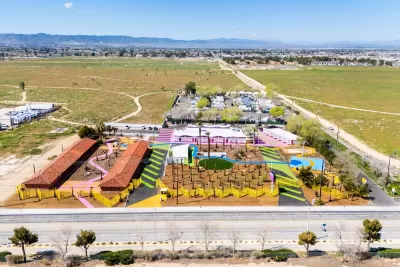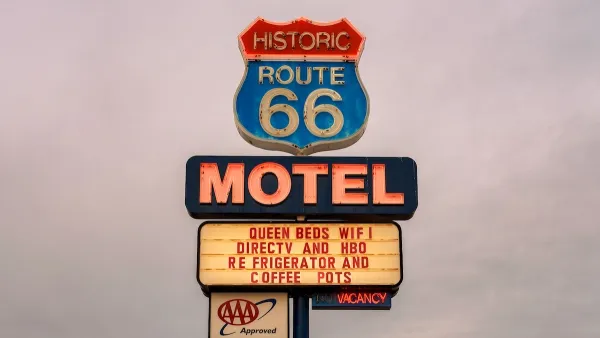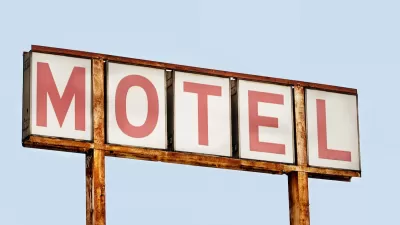Unlike most transitional housing, which is aimed at individuals, a project in the Southern California desert caters to families.

Two former motels in the desert community of Lancaster, California are now a colorful transitional housing complex with 38 units, reports Nate Berg in Fast Company.
As Berg explains, “Covering four acres, the $7 million campus is the latest location of Hope the Mission, a non-profit provider of homeless services working primarily in the L.A. region. Known as the Sierras, the campus includes housing, support services, a commercial kitchen that serves residents three meals a day, and a variety of outdoor recreation and exercise amenities.”
The complex is specifically geared toward families, a fact that heavily informs its design, which includes play areas and shade structures, a zig-zag fence for security, and walking paths. “Creating a mix of private, semi-private, and communal spaces was a priority for the project, which aims to be a stabilizing space for families as they transition out of homelessness.”
The project, designed by Kadre Architects, faced budgetary constraints and unanticipated challenges such as the need to remove aging septic tanks and build connections to the city’s sewer system. Kadre founder Nerin Kadribegovic takes an optimistic view, noting, “When your budgets are tight and you’re really driven to make an impact, it forces you to be more creative.”
FULL STORY: Architects transformed these rundown motels into vibrant homes for formerly unhoused families

Maui's Vacation Rental Debate Turns Ugly
Verbal attacks, misinformation campaigns and fistfights plague a high-stakes debate to convert thousands of vacation rentals into long-term housing.

Planetizen Federal Action Tracker
A weekly monitor of how Trump’s orders and actions are impacting planners and planning in America.

San Francisco Suspends Traffic Calming Amidst Record Deaths
Citing “a challenging fiscal landscape,” the city will cease the program on the heels of 42 traffic deaths, including 24 pedestrians.

Detroit Says Problems With Property Tax Assessments are Fixed. Advocates Disagree.
With higher-valued properties under assessed and lower-valued properties over assessed, advocates say there's still a problem with Detroit's property tax system.

Defunct Pittsburgh Power Plant to Become Residential Tower
A decommissioned steam heat plant will be redeveloped into almost 100 affordable housing units.

Trump Prompts Restructuring of Transportation Research Board in “Unprecedented Overreach”
The TRB has eliminated more than half of its committees including those focused on climate, equity, and cities.
Urban Design for Planners 1: Software Tools
This six-course series explores essential urban design concepts using open source software and equips planners with the tools they need to participate fully in the urban design process.
Planning for Universal Design
Learn the tools for implementing Universal Design in planning regulations.
Heyer Gruel & Associates PA
JM Goldson LLC
Custer County Colorado
City of Camden Redevelopment Agency
City of Astoria
Transportation Research & Education Center (TREC) at Portland State University
Jefferson Parish Government
Camden Redevelopment Agency
City of Claremont





























